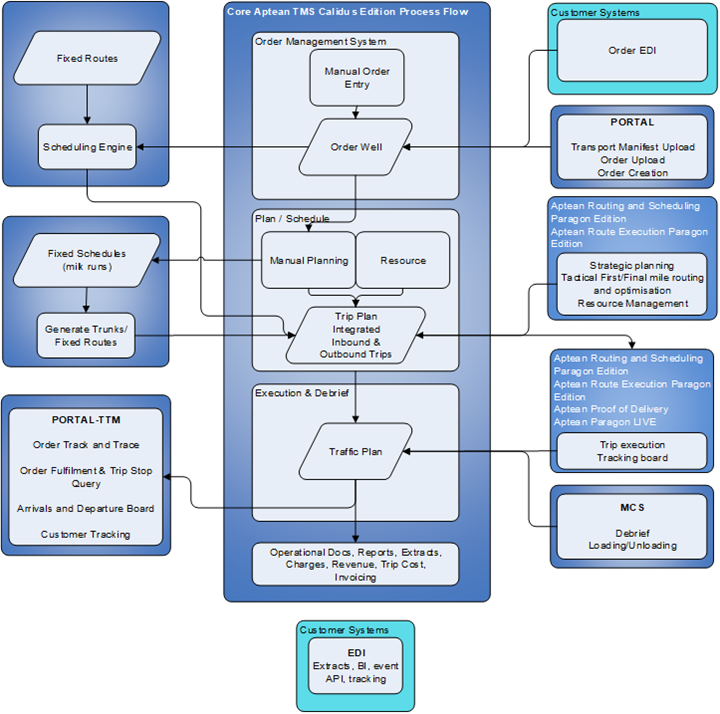Aptean Routing and Scheduling Overview
From CTMS
![]()
Aptean
Aptean Routing and Scheduling Overview
Calidus TMS and Paragon - various
21st May 2024 - 1.0
Reference: OVERVIEW
System Architecture

Systems:
- Aptean TMS Calidus Edition
- Aptean Routing & Scheduling Paragon Edition
- Aptean Portal
- TMS
- TTM
- Gateway
- Aptean Proof of Delivery
- FlexiPOD
- Track My Driver
- Aptean TMS Calidus Edition – Middle Mile Scanning (MCS)
Modules:
- Order Management
- EDI (import and export)
- Fixed Routes/Scheduling Engine (e.g. trunks)
- Fixed Schedules (e.g. Milk Runs)
- Planning, including:
- Routing & Scheduling, including optimisation, resource management.
- Manual planning
- Resourcing
- Tendering (3rd-party Carriers)
- Reporting – e.g. KPI/PvA
- Vehicle Tracking (through 3rd-party Vehicle Tracking links)
- Proof of Delivery – execution, tracking boards
- Customer Portal, including order entry/upload (TMS), track and trace (TTM)
- Customer Track and Trace self-service (Track My Driver and Gateway)
- Reporting, including extracts, formal reports (operational), customised extracts, scheduled BI extracts
- Finance - trip cost and order revenue generation from rate cards, invoicing
TMS vs Planning vs Both
Aptean recommends Aptean Routing and Execution plus Aptean TMS for full system functionality across the whole process set of an organisation.
Overview of Functionality
Aptean Routing & Scheduling and POD:
- Orders (high level volumes, not details)
- Planning
- Resource Management
- Execution - FlexiPOD, POD note
- Tracking - Track My Driver, Boards
- Vehicle Tracking
- Debrief - actual versus plan, reporting, dashboards, trip costs.
Aptean TMS Calidus Edition:
- Single point of data, regardless of source or how it is executed.
- Single process for order and trip lifecycles, regardless of source or how it is executed. In other words, when is planning, execution, middle mile, final mile, etc), automatically generating tasks for and importing tasks from other systems (such as Aptean Routing and Scheduling, Aptean POD, other third-party systems as required).
- Order well - much more detailed. Extensible, down to items and contents.
- Order generation – fixed schedules, milk runs, etc.
- Locations - reusable locations for variety of purposes (e.g. Depot, customer locations), with configuration that affects how jobs are planned or executed at a location level. Not just an address against an order.
- Order Integration - order well from many different inputs, in different formats
- Fixed routes - Middle-mile planning to outbase/RDC/Delivering depot
- Middle mile execution - scanning into and out of depots, palletisation, etc
- Manual or Overflow planning - 3rd party carrier
- Resource management - 1st/3rd party (known resources), 3rd party manual entry of resources.
- 3rd-party carrier process - tendering, acceptance, carrier invoicing, comparison, carrier restrictions.
- Finance - order revenue, trip costs, invoicing
- Operational documents (e.g. item labels, paper-based loading sheets, driver notes, manifests, etc)
- Pushed export back to system source, can be multiple, segregated based on source system.
- Single point of BI export regardless of source or how it was executed.